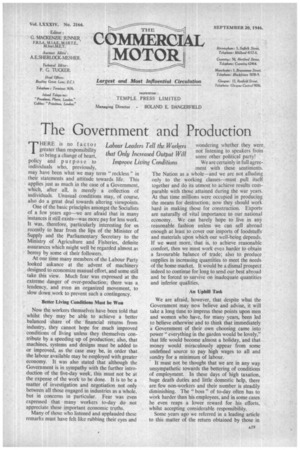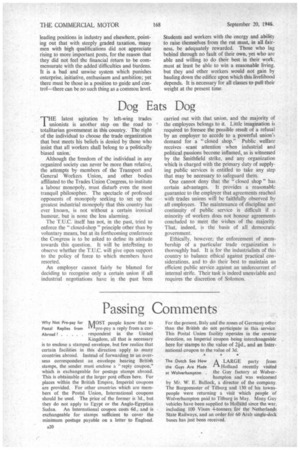The Government and Production
Page 21

Page 22

If you've noticed an error in this article please click here to report it so we can fix it.
THERE is no f actor greater than responsibility to bring a change of heart, policy and purpose to individuals who, previously, may have been what we may term " reckless " in their statements and attitude towards life. This applies just as much in the case of a Government, which, after all, is merely a collection of individuals. Unusual conditions may, of course, also do a great deal towards altering viewpoints. One of the basic principles amongst the Socialists of a few years ago—we are afraid that in many instances it still exists—was more pay for less work. It was, therefore, particularly interesting for us recently to hear from the lips of the Minister of Supply and the Parliamentary Secretary to the Ministry of Agriculture and Fisheries, definite assurances which might well be regarded almost as heresy by some of their followers.
At one time many members of the Labour Party looked askance at the advent of machinery designed to economize manual effort, and some still take this view. Much fear was expressed at the extreme danger of over-production; there was a tendency, and even an organized movement, to slow down work to prevent such a contingency.
Better Living Conditions Must be Won Now the workers themselves have been told that whilst they may be able to achieve a better balanced share of the financial returns from industry, they cannot hope for much improved conditions of living unless they themselves contribute by a speeding up of production; also, that machines, systems and designs must be added to or improved, as the case may be, in order that. the labour available may be employed with greater economy. It was also stated that although the Government is in sympathy with the further introduction of the five-day week, this must not be at the expense of the work to be done. It is to be a matter of investigation and negotiation not only between all those engaged in industries as a whole, but in concerns in particular. Fear was even expressed that many workers to-day do not appreciate these important economic truths.
Many of those who listened and applauded these remarks must have felt like rubbing their eyes and wondering whether they were not listening to speakers from some other political party!
We are certainly in full agreement with these sentiments. The Nation as a whole—and we are not alluding only to the working classes--must pull itself together and do its utmost to achieve results comparable with those attained during the war years. At that time millions were occupied in producing the means for destruction; now they should work hard in making those for construction. Exports are naturally of vital importance to our national economy. We can barely hope to live in any reasonable fashion unless we can sell abroad enough at least to cover our imports of foodstuffs and materials upon which our well-being depends. If we want more, that is, to achieve reasonable comfort, then we must work even harder to obtain a favourable balance of trade; also to produce supplies in increasing quantities to meet the needs of the home market. It would be a dismal prospect indeed to continue for long to send our best abroad and be forced to survive on inadequate quantities and inferior qualities.
An Uphill Task We are afraid, however, that despite what the Government may now believe and advise, it will take a long time to impress these points upon men and women who have, for many years, been led to believe otherwise and to think that immediately a Government of their own choosing came into power " everything in the garden would be lovely," that life would become almost a holiday, and that money would miraculously appear from some undefined source to pay high wages to all and sundry for a minimum of labour.
It must not be thought that we are in any way unsympathetic towards the bettering of conditions of employment. In these days of high taxation, huge death duties and little domestic help, there are few non-workers and their number is steadily diminishing. The " boss " of to-day often has to work harder than his employees, and in some cases he even reaps a lower reward for his efforts, whilst accepting considerable responsibility.
Some years ago we referred in a leading article to this matter of the return obtained by those in leading positions in industry and elsewhere, pointing out that with steeply graded taxation, many men with high qualifications did not appreciate rising to more important posts, for the reason that they did not feel the financial return to be commensurate with the added difficulties and burdens. It is a bad and unwise system which punishes enterprise, initiative, enthusiasm and ambition; yet there must be those in a position to guide and controI—there can be no such thing as a common level. Students and workers with the energy and ability to raise themselves from the rut must, in all fairness, be adequately rewarded. Those who lag behind through no fault of their own, yet who are able and willing to do their best in their work. must at least be able to win a reasonable living, but they and other workers would not gain by hauling down the edifice upon which this livelihood depends. It is necessary for all classes to pull their weight at the present time.




































































